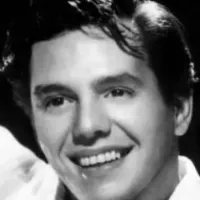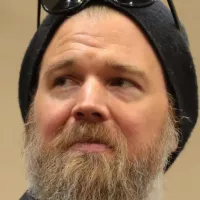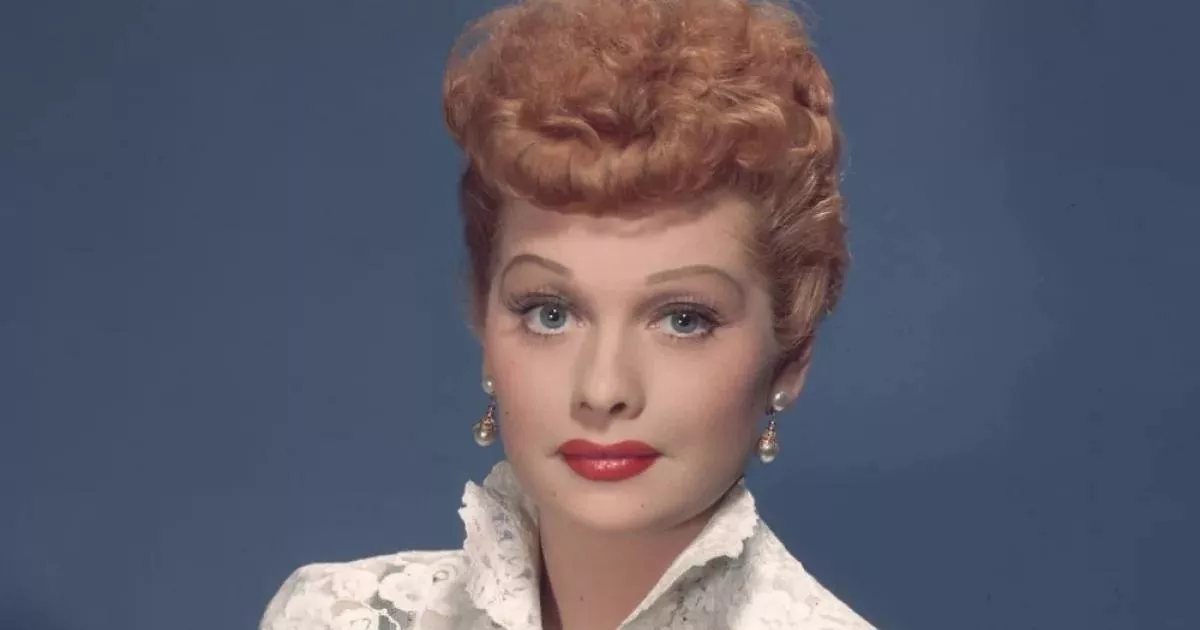Lucille Ball was a highly influential American actress, comedian, producer, and studio executive, recognized by Time as one of the most influential women of the 20th century. She is best known for her groundbreaking sitcom "I Love Lucy", which she both starred in and produced. Ball received numerous accolades throughout her career, including five Primetime Emmy Awards, the Golden Globe Cecil B. DeMille Award, and two stars on the Hollywood Walk of Fame. She was inducted into the Television Hall of Fame and received a Kennedy Center Honor, solidifying her status as a comedic icon.
August 6, 1911: Lucille Ball's Birth
On August 6, 1911, Lucille Désirée Ball was born. She would become an American actress, comedian, producer, and studio executive.
February 28, 1915: Death of Lucille Ball's Father
On February 28, 1915, Lucille Ball's father died of typhoid fever at the age of 27 when Lucille was only three years old.
1925: Dating Johnny DeVita
In 1925, at the age of 14, Lucille Ball began dating Johnny DeVita, a 21-year-old local hoodlum.
1926: Enrollment in Drama School
In 1926, Lucille Ball enrolled in the John Murray Anderson School for the Dramatic Arts in New York City.
1927: Family Move to Jamestown Apartment
In 1927, Lucille Ball's family was forced to move to a small apartment in Jamestown after their house and furnishings were sold to settle a legal judgment.
1928: Return to New York City
In 1928, Lucille Ball returned to New York City and began working as an in-house model for Hattie Carnegie.
1929: Career Beginnings
In 1929, Lucille Ball began her career as a model and started performing on Broadway under the name Diane Belmont.
1932: Return to NYC
In 1932, Lucille Ball moved back to New York City to resume her pursuit of an acting career, working for Carnegie and as the Chesterfield cigarette girl.
1933: Goldwyn Girl in Roman Scandals
In 1933, Lucille Ball had an uncredited role as a Goldwyn Girl in "Roman Scandals".
1934: Two-Reel Comedy Short
In 1934, Lucille Ball appeared in a two-reel comedy short with The Three Stooges called "Three Little Pigskins".
1935: RKO Musicals
In 1935, Lucille Ball appeared in Fred Astaire and Ginger Rogers RKO musicals "Roberta" and "Top Hat".
1936: First Credited Role in Chatterbox
In 1936, Lucille Ball had her first credited role in "Chatterbox".
1936: Landing Role in Hey Diddle Diddle
In 1936, Lucille Ball landed a role in the Bartlett Cormack play "Hey Diddle Diddle", set in a duplex apartment in Hollywood.
1936: Registered to vote as Communist
In 1936, Lucille Ball registered to vote and listed her party affiliation as Communist, as did her brother and mother, reflecting a political alignment at that time.
1936: Supports Communist Party candidate
In 1936, Lucille Ball sponsored the Communist Party's candidate for the California State Assembly and was appointed to the state's Central Committee, marking her involvement in political activities.
1936: Delegate to the State Central Committee of the Communist Party of California
In 1936, Lucille Ball stated that if she had been appointed as a delegate to the State Central Committee of the Communist Party of California it was done without her knowledge or consent.
1936: Registered to vote
In 1936, Lucille Ball stated that she had registered to vote as a Communist or intended to vote the Communist Party ticket at her socialist grandfather's insistence.
January 21, 1937: Hey Diddle Diddle Premiere
On January 21, 1937, "Hey Diddle Diddle" premiered in Princeton, New Jersey, with Lucille Ball playing Julie Tucker. The play closed after one week in Washington, D.C.
1937: Address identified as location for Communist class
In 1937, Hollywood writer Rena Vale testified that she attended a Communist class at an address identified as Lucille Ball's home, which later became part of a HUAC investigation.
1937: The Phil Baker Show
In 1937, Lucille Ball appeared regularly on "The Phil Baker Show".
1937: Stage Door
In 1937, Lucille Ball played a larger part in the film "Stage Door" alongside Ginger Rogers and Katharine Hepburn.
1938: Room Service
In 1938, Lucille Ball appeared in the movie "Room Service" with the Marx Brothers.
1938: The Wonder Show
In 1938, Lucille Ball joined the cast of "The Wonder Show" starring Jack Haley.
April 7, 1939: The Wonder Show Final Episode
On April 7, 1939, the final episode of "The Wonder Show" aired.
1939: Five Came Back
In 1939, Lucille Ball starred in the B-movie "Five Came Back".
July 22, 1940: Rena Vale Testimony
On July 22, 1940, Hollywood writer Rena Vale gave testimony before the United States House of Representatives' Special House Un-American Activities Committee (HUAC).
November 1940: Marriage to Desi Arnaz
In November 1940, Lucille Ball eloped with Cuban bandleader Desi Arnaz.
November 30, 1940: Elopes with Desi Arnaz
On November 30, 1940, Lucille Ball eloped with Cuban-born bandleader Desi Arnaz, two months after they met while filming "Too Many Girls", marking the beginning of their marriage.
1940: Too Many Girls
In 1940, Lucille Ball starred in "Dance, Girl, Dance" and "Too Many Girls", where she met Desi Arnaz.
1942: Arnaz Drafted into the Army
In 1942, Desi Arnaz was drafted into the Army, but classified for limited service due to a knee injury. He stayed in Los Angeles and performed USO shows.
1942: The Big Street
In 1942, Lucille Ball starred opposite Henry Fonda in "The Big Street".
1943: Du Barry Was a Lady and Best Foot Forward
In 1943, Lucille Ball starred in "Du Barry Was a Lady" and portrayed herself in "Best Foot Forward".
1944: Files for divorce from Desi Arnaz
In 1944, Lucille Ball filed for divorce from Desi Arnaz, but they later reconciled before the divorce was finalized.
1944: Featured in Fund Raising for Roosevelt
In 1944, Lucille Ball prominently featured in a Pathé News newsreel titled "Fund Raising for Roosevelt", supporting President Franklin D. Roosevelt's campaign for the March of Dimes.
1946: Lover Come Back and The Dark Corner
In 1946, Lucille Ball starred in "Lover Come Back" and "The Dark Corner".
1947: Lured
In 1947, Lucille Ball appeared in the murder mystery "Lured".
1948: My Favorite Husband
In 1948, Lucille Ball was cast as Liz Cooper in "My Favorite Husband", a radio comedy for CBS Radio.
July 17, 1951: Birth of Daughter Lucie Désirée Arnaz
On July 17, 1951, Lucille Ball gave birth to her daughter, Lucie Désirée Arnaz, marking a significant personal event.
October 15, 1951: I Love Lucy Premiere
On October 15, 1951, "I Love Lucy" premiered on CBS, becoming a star vehicle for Lucille Ball and a means to salvage her marriage to Desi Arnaz.
1951: Birth of Lucie Arnaz
In 1951, Lucille Ball gave birth to her first child, Lucie Arnaz.
1952: Voted for Dwight D. Eisenhower
In the 1952 United States presidential election, Lucille Ball stated that she voted for Republican Dwight D. Eisenhower, contrasting with her earlier registration as a Communist.
January 19, 1953: Birth of Desi Arnaz Jr. and Airing of I Love Lucy episode
On January 19, 1953, Lucille Ball delivered her second child, Desi Arnaz Jr., while the I Love Lucy episode featuring her character's pregnancy aired to 44 million viewers. The birth made the cover of TV Guide.
September 4, 1953: Testifies before HUAC investigator
On September 4, 1953, Lucille Ball voluntarily met with HUAC investigator William A. Wheeler, providing sealed testimony about her past registration as a Communist and her intentions in 1936.
1954: The Long, Long Trailer
In 1954, during the production breaks of "I Love Lucy", Lucy and Desi starred together in the feature film "The Long, Long Trailer".
October 1956: Appears on Bob Hope Special
In October 1956, Lucille Ball, Desi Arnaz, Vivian Vance, and William Frawley appeared together on a Bob Hope special on NBC, including a spoof of I Love Lucy, marking the only time all four stars were on a color telecast.
1956: Forever, Darling
In 1956, during the production breaks of "I Love Lucy", Lucy and Desi starred together in the feature film "Forever, Darling".
1957: CBS Buys Back Rights
In 1957, CBS bought back the rights to "I Love Lucy" for $1,000,000, which financed Ball and Arnaz's down payment for the purchase of the former RKO Pictures studios, which they turned into Desilu Studios.
1959: Becomes a Friend and Mentor to Carol Burnett
In 1959, Lucille Ball became a friend and mentor to Carol Burnett, guesting on her CBS-TV special "Carol + 2".
February 8, 1960: Receives Stars on the Hollywood Walk of Fame
On February 8, 1960, Lucille Ball received two stars on the Hollywood Walk of Fame, one for motion pictures and another for her contributions to television.
March 3, 1960: Files for Divorce from Desi Arnaz
On March 3, 1960, Lucille Ball filed for divorce from Desi Arnaz, claiming their married life was "a nightmare," marking the end of their high-profile marriage.
May 4, 1960: Divorce Finalized
On May 4, 1960, Lucille Ball and Desi Arnaz's divorce was finalized, ending their marriage, though they remained friends until his death.
1960: Desilu Ownership
After her divorce in 1960, Lucille Ball bought out Desi Arnaz's share of Desilu and became a very actively engaged studio head.
1960: Broadway Debut
From 1960 to 1961, Lucille Ball produced and starred in the Broadway musical "Wildcat".
1960: The Lucy-Desi Comedy Hour Ends
In 1960, after "I Love Lucy" ended, the main cast continued to appear in occasional hour-long specials under the title "The Lucy-Desi Comedy Hour".
1960: Wildcat ends its run early
In 1960, the Broadway musical "Wildcat," starring Lucille Ball, ended its run prematurely due to Ball's illness and declining ticket sales. Despite the show's failure, it produced the memorable song "Hey, Look Me Over," which Ball famously performed on The Ed Sullivan Show.
November 19, 1961: Marries Gary Morton
On November 19, 1961, Lucille Ball married Gary Morton, a Borscht Belt comic, marking the beginning of her second marriage.
1961: Marriage to Gary Morton
In 1961, Lucille Ball married Gary Morton, marking the start of her second marriage, which she reflected on positively in later years.
1962: Desilu Productions Leadership
In 1962, Lucille Ball became the first woman to run a major television studio, Desilu Productions.
1962: Stars in The Lucy Show
In 1962, Lucille Ball starred in "The Lucy Show" on CBS with Vivian Vance and Gale Gordon, which ran until 1968, adding another successful sitcom to her career.
1964: Attends Lucy Day at the New York World's Fair
In 1964, Lucille Ball and her second husband, Gary Morton, attended "Lucy Day", a celebration in her honor held by the New York World's Fair, recognizing her cultural impact.
1964: Hosts CBS Radio Talk Show
In 1964, Lucille Ball began hosting a CBS Radio talk show titled "Let's Talk to Lucy," showcasing her versatility beyond television acting.
1964: Collaborates on Autobiography
In the early 1960s, influenced by Norman Vincent Peale, Lucille Ball collaborated with Betty Hannah Hoffman on an autobiography covering her life until 1964.
1965: Vivian Vance Leaves The Lucy Show
In 1965, Vivian Vance left "The Lucy Show", and Gale Gordon joined the show.
1966: Manuscript Found
In 1966, Lucille Ball's manuscript was found after being postmarked from the 1960's.
1967: Sale of Desilu
In 1967, Lucille Ball sold her shares of Desilu to Gulf+Western for $17,000,000, and it was renamed Paramount Television.
1968: The Lucy Show Ends
In 1968, "The Lucy Show" ended its run.
1968: Appears in Yours, Mine, and Ours
In 1968, Lucille Ball starred in the movie "Yours, Mine, and Ours", adding to her filmography of comedic roles.
1974: Here's Lucy Ends
In 1974, "Here's Lucy" ended its run.
1974: Appears in the musical Mame and on the Dick Cavett Show
In 1974, Lucille Ball starred in the musical "Mame" and appeared on The Dick Cavett Show where she discussed her career and personal life.
1976: CBS Salutes Lucy: The First 25 Years
In 1976, CBS paid tribute to Lucille Ball with the two-hour special "CBS Salutes Lucy: The First 25 Years", which marked the first time Ball and Arnaz appeared on screen together in 16 years.
1979: Assistant Professor at California State University
In 1979, Lucille Ball became an assistant professor at California State University, Northridge, showcasing her interest in education alongside her acting career.
1980: Stars in Comedy Television Specials
Around 1980, Lucille Ball starred in comedy television specials, including "Lucy Calls the President" and "Lucy Moves to NBC", which depicted her transition to the NBC television network.
1980: Lucille Ball Expresses Support for Gay Rights
In a 1980 interview with People, Lucille Ball stated her support for gay rights, acknowledging the talent of homosexual individuals and questioning criticism towards them.
1982: Hosts Three's Company Retrospective
In 1982, Lucille Ball hosted a two-part "Three's Company" retrospective, showcasing clips and commenting on the show's memorable moments, highlighting her appreciation for the series.
1983: Partners to Set Up Film and Television Production House
In 1983, Lucille Ball and Gary Morton partnered to establish a film and television production house at 20th Century Fox, planning to produce both films and plays.
1983: Comments on marriage to Gary Morton
In 1983, Lucille Ball wrote to a friend expressing her happiness with her marriage to Gary Morton, remarking on how unexpected and fulfilling it was after her previous marriage.
1985: Stars in Stone Pillow
In 1985, Lucille Ball starred in "Stone Pillow", a made-for-TV dramatic film about a homeless woman, which received mixed reviews but garnered strong viewership.
December 7, 1986: Kennedy Center Honors Recipient
On December 7, 1986, Lucille Ball was recognized as a Kennedy Center Honors recipient. Robert Stack introduced Lucy in place of Desi Arnaz.
1986: Death of Desi Arnaz
In 1986, Desi Arnaz died, marking the end of Lucille Ball's former husband's life; however, they remained friends and often spoke fondly of each other.
1986: Life with Lucy canceled
In 1986, Lucille Ball's sitcom comeback, "Life with Lucy", was canceled by ABC shortly after its premiere, despite costarring Gale Gordon and being co-produced by Ball, Gary Morton, and Aaron Spelling.
February 1988: Named Hasty Pudding Woman of the Year
In February 1988, Lucille Ball was honored as the Hasty Pudding Woman of the Year, recognizing her contributions to entertainment.
May 1988: Hospitalized after heart attack
In May 1988, Lucille Ball was hospitalized after suffering a mild heart attack, marking a health scare in her later years.
April 18, 1989: Admitted to Hospital
On April 18, 1989, Lucille Ball was admitted to Cedars-Sinai Medical Center in Los Angeles after experiencing chest pains and diagnosed with a dissecting aortic aneurysm, leading to surgery.
April 26, 1989: Lucille Ball's Death
On April 26, 1989, Lucille Ball died at the age of 77 from an abdominal aortic aneurysm.
July 6, 1989: Receives Presidential Medal of Freedom
On July 6, 1989, Lucille Ball posthumously received the Presidential Medal of Freedom from President George H. W. Bush, honoring her contributions to American culture.
1989: American Comedy Awards Named "The Lucy"
After her death in 1989, the American Comedy Awards were officially dubbed "The Lucy" in honor of Lucille Ball.
1989: Final Public Appearance at the Academy Awards
In 1989, just a month before her death, Lucille Ball made her final public appearance at the Academy Awards telecast, receiving a standing ovation alongside Bob Hope, celebrating her lasting impact on entertainment.
June 7, 1990: Opening of Lucy – A Tribute
On June 7, 1990, Universal Studios Florida opened Lucy – A Tribute, a walk-through attraction dedicated to Lucille Ball. The attraction featured clips of her shows, facts about her life, displays of her belongings, and an interactive quiz.
1997: Autobiography Published
In 1997, Lucille Ball's autobiography, which she had begun in the early 1960s, was published by Berkley Publishing Group, years after her death, preserving her life story.
August 6, 2001: US Postal Service Commemorative Stamp
On August 6, 2001, the United States Postal Service honored what would have been Lucille Ball's 90th birthday with a commemorative stamp as part of its Legends of Hollywood series.
2001: Induction into National Women's Hall of Fame
In 2001, Lucille Ball was inducted into the National Women's Hall of Fame for her contributions to the Women's Movement.
2002: Remains Re-interred at Lake View Cemetery
In 2002, Lucille Ball's remains were re-interred at the Hunt family plot at Lake View Cemetery in Jamestown, New York, alongside her mother, fulfilling her wish to be buried near her.
November 2007: Chosen as Number Two on List of 50 Greatest TV Icons
In November 2007, Lucille Ball was chosen as number two on a list of the 50 Greatest TV Icons, though a public poll chose her as number one.
2007: Death of Lucille Ball's brother Fred Ball
In 2007, Lucille Ball's brother Fred Ball passed away.
2007: Remains of Fred Henry Ball interred at Lake View Cemetery
In 2007, the remains of Lucille Ball's brother, Fred Henry Ball, were interred at the Hunt family plot at Lake View Cemetery, joining Lucille and their mother.
2008: "I Love Lucy" Ranked Second-Best TV Program
In 2008, TV Guide named I Love Lucy the second-best television program in American history, after Seinfeld.
August 6, 2011: Google Doodle and Look-Alike Gathering
On August 6, 2011, Google's homepage displayed an interactive doodle of six classic moments from I Love Lucy to commemorate what would have been Lucille Ball's 100th birthday. Simultaneously, 915 Lucille Ball look-alikes gathered in Jamestown, setting a new world record.
August 1, 2016: Announcement of New Statue for Lucille Ball
On August 1, 2016, it was announced that a new statue of Lucille Ball would replace the existing one in Celoron, New York, on August 6 due to resident complaints. The original statue, nicknamed "Scary Lucy", became a tourist attraction after media attention.
2017: Will & Grace Homage to Lucille Ball
In 2017, an episode of Will & Grace paid homage to Lucille Ball by replicating the 1963 shower scene from "The Lucy Show" episode, "Lucy and Viv Put in a Shower".
July 9, 2018: Book Released on Audio
On July 9, 2018, Lucille Ball's autobiography was released on audio through Audible, read by her daughter, bringing her story to a new audience.
2020: Time Recognition
In 2020, Time magazine recognized Lucille Ball as one of the most influential women of the 20th century.
February 8, 2022: Nicole Kidman Receives Academy Award Nomination
On February 8, 2022, Nicole Kidman received a nomination for the Academy Award for Best Actress for her portrayal of Lucille Ball in "Being the Ricardos". Kidman also won the Golden Globe Award for Best Actress in a Motion Picture – Drama for her performance.
January 2023: L.A. Theatre Works Mounts US National Tour of "LUCY LOVES DESI"
In January 2023, L.A. Theatre Works mounted a 22-city U.S. national tour of the play "LUCY LOVES DESI: A Funny Thing Happened on the Way to the Sitcom", starring Ellis Greer as Lucille Ball.
Mentioned in this timeline

Google LLC is a multinational technology corporation specializing in a...
CBS Broadcasting Inc CBS is a prominent American commercial broadcast...
California is a U S state on the Pacific Coast...

Desi Arnaz was a Cuban-American entertainer best known for his...
The Kennedy Center Honors are annual awards recognizing individuals and...
The National Broadcasting Company NBC is a major American commercial...
Trending
13 minutes ago Lesotho: Frontliners help family overcome poverty; South Africa sees tourism boom in 2026.

1 hour ago Ryan Hurst's Kratos Revealed in Prime Video's 'God of War' Series: Cast Updates

1 hour ago Cowboys to Franchise Tag George Pickens for $28 Million: A Bold Move

1 hour ago Rublev dominates Rinderknech, secures Dubai 2026 SFs spot; stats rival Djokovic, Federer.
14 minutes ago Samsung Galaxy S26 Series Unveiled: Intuitive AI Phone with Snapdragon 8 Elite Gen 5.
19 hours ago Dell Projects AI Server Boom to Spur $50 Billion in Sales by 2027
Popular

Jesse Jackson is an American civil rights activist politician and...

Barack Obama the th U S President - was the...

Susan Rice is an American diplomat and public official prominent...

XXXTentacion born Jahseh Dwayne Ricardo Onfroy was a controversial yet...

Michael Joseph Jackson the King of Pop was a highly...

Kashyap Pramod Patel is an American lawyer who became the...
